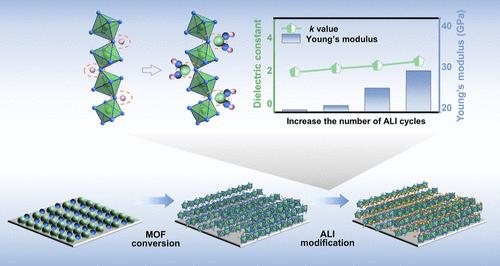当前位置:
X-MOL 学术
›
Chem. Mater.
›
论文详情
Our official English website, www.x-mol.net, welcomes your
feedback! (Note: you will need to create a separate account there.)
Atomic Regulation of Metal–Organic Framework Thin Film for Low-k Dielectric
Chemistry of Materials ( IF 7.2 ) Pub Date : 2024-11-07 , DOI: 10.1021/acs.chemmater.4c02057 Meng Cao, Jisheng Song, Haonan Ren, Fan Yang, Rong Chen
Chemistry of Materials ( IF 7.2 ) Pub Date : 2024-11-07 , DOI: 10.1021/acs.chemmater.4c02057 Meng Cao, Jisheng Song, Haonan Ren, Fan Yang, Rong Chen

|
With the development of integrated circuit miniaturization, the RC delay caused by the interconnect resistance of metal wires and the capacitance of interlayer dielectric materials limits the high integration and miniaturization of electronic devices. As a promising low-k dielectric material, metal–organic frameworks (MOFs) can effectively alleviate this problem. In this work, we report an atomic regulation strategy of ultralow k MIL-53 film, achieved by converting an Al2O3 seed layer deposited via atomic layer deposition (ALD) and subsequently modifying through atomic layer infiltration (ALI). Thanks to the linear relationship between the thickness of the MIL-53 film and the Al2O3 seed layer prepared by ALD, precise nanoscale control of the MIL-53 films was realized. To meet both mechanical and dielectric property requirements, ALI modification is introduced, effectively regulating Young’s modulus and hardness of MIL-53 films from 19.5 and 0.17 GPa to 29.1 and 0.36 GPa, respectively, while the dielectric constant can be tuned from 1.93 to 2.59. The reconciliation of these properties is achieved by regulating the porosity of the MIL-53 framework through the additional Al–O clusters during the ALI. Furthermore, the superhydrophobic properties (140.7°) and the nearly constant dielectric constant after 9 months of aging reflect its potential as a dielectric insulating material. The proposed preparation and modification strategy of MOF films based on atomic regulation has broad potential for application in low-k interconnect integrated circuits.
中文翻译:

用于低 k 电介质的金属-有机框架薄膜的原子调控
随着集成电路小型化的发展,金属线的互连电阻和层间介电材料的电容引起的RC延迟限制了电子器件的高度集成化和小型化。金属有机框架 (MOF) 作为一种很有前途的低 k 介电材料,可以有效缓解这一问题。在这项工作中,我们报道了一种超低 k MIL-53 薄膜的原子调节策略,该策略是通过转化通过原子层沉积 (ALD) 沉积的 Al2O3 种子层,随后通过原子层渗透 (ALI) 进行修饰来实现的。由于 MIL-53 薄膜的厚度与 ALD 制备的 Al2O3 种子层之间的线性关系,实现了对 MIL-53 薄膜的精确纳米级控制。为了满足机械和介电性能要求,引入了 ALI 改性,有效地将 MIL-53 薄膜的杨氏模量和硬度从 19.5 和 0.17 GPa 调节到 29.1 和 0.36 GPa,同时介电常数可以在 1.93 到 2.59 之间调整。这些特性的调和是通过在 ALI 期间通过额外的 Al-O 簇调节 MIL-53 框架的孔隙率来实现的。此外,超疏水性能 (140.7°) 和老化 9 个月后几乎恒定的介电常数反映了其作为介电绝缘材料的潜力。所提出的基于原子调节的 MOF 薄膜制备和改性策略在低 k 互连集成电路中具有广阔的应用潜力。
更新日期:2024-11-07
中文翻译:

用于低 k 电介质的金属-有机框架薄膜的原子调控
随着集成电路小型化的发展,金属线的互连电阻和层间介电材料的电容引起的RC延迟限制了电子器件的高度集成化和小型化。金属有机框架 (MOF) 作为一种很有前途的低 k 介电材料,可以有效缓解这一问题。在这项工作中,我们报道了一种超低 k MIL-53 薄膜的原子调节策略,该策略是通过转化通过原子层沉积 (ALD) 沉积的 Al2O3 种子层,随后通过原子层渗透 (ALI) 进行修饰来实现的。由于 MIL-53 薄膜的厚度与 ALD 制备的 Al2O3 种子层之间的线性关系,实现了对 MIL-53 薄膜的精确纳米级控制。为了满足机械和介电性能要求,引入了 ALI 改性,有效地将 MIL-53 薄膜的杨氏模量和硬度从 19.5 和 0.17 GPa 调节到 29.1 和 0.36 GPa,同时介电常数可以在 1.93 到 2.59 之间调整。这些特性的调和是通过在 ALI 期间通过额外的 Al-O 簇调节 MIL-53 框架的孔隙率来实现的。此外,超疏水性能 (140.7°) 和老化 9 个月后几乎恒定的介电常数反映了其作为介电绝缘材料的潜力。所提出的基于原子调节的 MOF 薄膜制备和改性策略在低 k 互连集成电路中具有广阔的应用潜力。

































 京公网安备 11010802027423号
京公网安备 11010802027423号